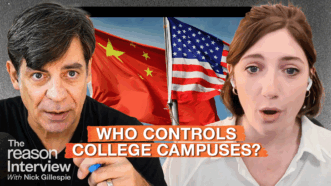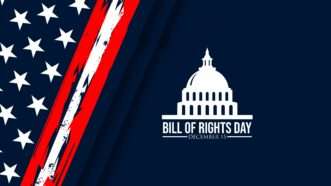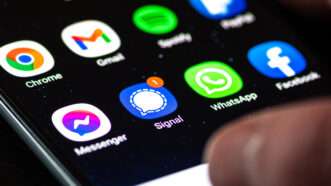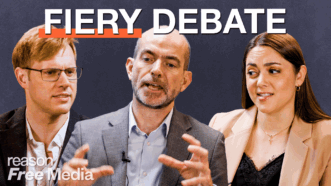Free Speech
Penn State Basketball Player vs. Head Coach Defamation Lawsuit Can Go Forward (but Not as to the Disrespectful "Bro")
"[The coach's alleged statement] can reasonably be inferred as ... defamatory ... about Clary—that Clary himself was greedy and only interested in money and, as a result, abandoned [his] team and refused to play for Penn State."
Court Refuses to Block Medical Journal's Retraction of COVID Vaccine Study That Had ~150K Views
The court concluded that a retraction likely wouldn't breach any publication contract, and that under the circumstances a temporary restraining order would be especially unjustified given the publisher's First Amendment rights.
Netflix and Paramount Will Fight for Trump's Favor
Which is what progressive fans of antitrust want, no?
Want To Vacation In America? Trump Wants To See Your Social Media Posts First.
The move is bad for free speech and bad for American businesses that depend on tourism.
Massachusetts Church's 'ICE Was Here' Nativity Scene Is Protected Speech, Even if ICE Doesn't Like It
Rev. Stephen Josoma of St. Susanna Parish defended the message against the Trump administration's immigration enforcement.
How Foreign Governments Police U.S. Speech
Sarah McLaughlin reveals how foreign governments pressure American universities through speech codes and satellite campuses, and examines the broader threat international authoritarianism poses to free expression.
Survey: 91 Percent of College Students Think 'Words Can Be Violence.' That Could Feed Real Violence.
But there's a silver lining—sort of.
No Injunction Against Prosecution for Taking Photo of Transgender Politician Washing Hands in Women's Restroom
So holds a Fifth Circuit panel, over a dissent. Note that part of the majority's rationale is that the photo would only violate the statute if the prosecution can show that defendant intended to invade privacy in a way "highly offensive to a reasonable person of ordinary sensibilities."
Journal of Free Speech Law: "Incitement, Enthusiasm, and the Dangers of Negligent Protest," by John Inazu
From the "Gitlow v. New York at 100" symposium, held this year at the Arizona State University Sandra Day O'Connor College of Law.
Bill of Rights Day: How Your Rights Keep Authoritarianism in Check
The document remains remarkably resilient, even as Republicans and Democrats keep launching assaults on liberty.
Ayn Rand Denounced the FCC's 'Public Interest' Censorship More Than 60 Years Ago
In her 1962 essay "Have Gun, Will Nudge," Rand foresaw how government officials would seek to silence people they don't like.
Plaintiff Can Add Claims to Case Alleging Carnegie Mellon Prof Said Time on Jewish-Related Project "Would Have Been Better Spent" Exploring "What Jews Do to Make Themselves Such a Hated Group"
One claim is that CMU's Chief Diversity Officer illegally recorded meeting with student and the accused professor—and then apparently "asserted her Fifth Amendment rights when ... asked her if she did so or if she had a pattern or practice of recording student meetings, without their consent, in the scope of her duties."
Journal of Free Speech Law: "Gitlow as a Guide to Holmes," by Joseph Blocher
From the "Gitlow v. New York at 100" symposium, held this year at the Arizona State University Sandra Day O'Connor College of Law; other papers from that symposium will be published shortly.
Anti-Stalking Injunction Requires More Than Just a Showing of "Being Weirded Out or Uncomfortable"
"[Appellants'] homemade signs talked about May being mental health awareness month, one referenced the movie One Flew Over the Cuckoo's Nest and included a photograph of actor Jack Nicholson, one mentioned perimenopause and empty nest syndrome, one said '[h]ere comes da judge' around the time that Appellee had a divorce hearing .... Another sign included the language '[h]ere's looking at you kid' and contained a photo of Humphrey Bogart."
Free Speech Unmuted: Defamation Law in the Age of AI with Lyrissa Lidsky
My cohost Jane Bambauer and I are joined by Prof. Lyrissa Lidsky (Florida), who is also a co-reporter for the American Law Institute's Restatement (Third) of Torts: Defamation and Privacy.
Journal of Free Speech Law: "Free Speech and Incorporation: A Reassessment," by Ilan Wurman
From the "Gitlow v. New York at 100" symposium, held this year at the Arizona State University Sandra Day O'Connor College of Law; other papers from that symposium will be published shortly.
Journal of Free Speech Law: "What Did Gitlow Do?," by James Stern
From the "Gitlow v. New York at 100" symposium, held this year at the Arizona State University Sandra Day O'Connor College of Law; other papers from that symposium will be published here in the coming weeks.
Second Circuit Upholds Injunction Protecting Speech About "Abortion Pill Reversal"
Such speech by the National Institute of Family & Life Advocates in this case, the court concluded, was noncommercial speech that was subject to broad First Amendment protection, rather than less protected "commercial speech."
Journal of Free Speech Law: "Suspicion, Deference, and the First Amendment," by Helen Norton
From the "Gitlow v. New York at 100" symposium, held this year at the Arizona State University Sandra Day O'Connor College of Law; other papers from that symposium will be published here in the coming weeks.
Lawmakers To Consider 19 Bills for Childproofing the Internet
KOSA is back, along with more than a dozen other bills that will erode free speech and privacy in the name of protecting kids.
Showing Plaintiffs' House in an Ad for Netflix Real Estate Reality Show Isn't Actionable Invasion of Privacy,
even if it leads people "to visit plaintiffs’ home 'on a daily basis' asking to see it and claiming they learned it was for sale through the Buying Beverly Hills advertisement."
The 'Free' World Is Coming for Your Private Messages
Nobody expects China or Iran to protect privacy. But as seen in the European debate over chat control, even nominally free countries are becoming intrusive when it comes to the digital world.
Journal of Free Speech Law: "The Enigma of Gitlow: Positivism, Liberty, Democracy, and Freedom of Speech," by Robert Post
The keynote address from the "Gitlow v. New York at 100" symposium, held this year at the Arizona State University Sandra Day O'Connor College of Law; other papers from that symposium will be published here in the coming weeks.
The Pentagon and the FBI Are Investigating 6 Legislators for Exercising Their First Amendment Rights
The Trump administration is desperately trying to criminalize a video noting that service members have no obligation to follow unlawful orders.
Texas Man Faces Up to 40 Years in Prison for Transporting Constitutionally Protected Pamphlets
The government treats anarchist zines as evidence of terrorism.
Elon Musk's 'Account Based In' Feature Has Already Improved X
Foreign grifters are posting clickbait to make money from X's revenue-sharing program.
Councilman's Threatening Outside Counsel Law Firm into Firing Attorney May Violate First Amendment
"A Nashville city councilman threatened to withdraw business from a law firm, which served as the city's outside counsel, due to the position one of its attorneys took as the chair of the county election commission on a tax referendum."
Trump's Habitual Charges of 'Treason' Reflect His Authoritarian Impulses
The president’s reaction to a supposedly "seditious" video illustrates his tendency to portray criticism of him as a crime.
"Spy" vs. "Spy" (+ Piers Morgan, President Biden, and the Iranian Nuclear Weapons Program)
If someone was prosecuted (and later pardoned) for being an unregistered foreign agent for Iran, is it defamatory to say he was prosecuted for "spying"?















